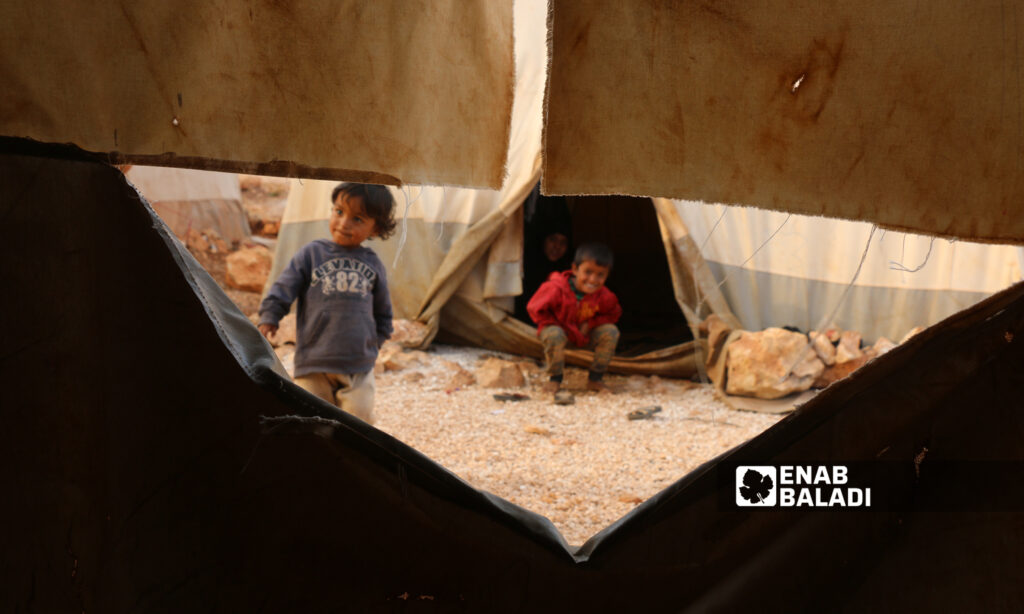Idlib – Hadia Mansour
Layal al-Shawaf has been dreaming of an end to noises coming from other tents to her own. Sounds of crying babies have kept her awake for many nights while being careful to talk to her husband and children in whispers for fear of being heard by the neighboring tents’ inhabitants, which would be a source of great embarrassment, particularly when quarreling with her husband or having intimate moments.
“I am tired of the camp’s noises and lack of privacy. I feel exposed to all the camp’s residents and have forgotten the last time I felt comfortable here. You can know what is happening in other tents by simply sitting in your tent,” al-Shawaf told Enab Baladi.
The twenty-something young woman added that she can no longer bear to live in camps of makeshift tents, which resemble “a big prison with controls restricting women’s movements and acts.”
Al-Shawaf also wished for a near end to her difficult situation, fearing falling sick or getting mad as a result. She told Enab Baladi that living amid the aforementioned circumstances is placing tremendous pressure on her, eventually leading to her developing physical or psychological diseases.
Internally displaced women living in camps of Idlib and other regions in northwestern Syria have lost their sense of psychological relief, calm, and privacy the moment they left their houses which fell under the control of the Syrian regime forces. Suddenly, these women’s days became filled with various noises coming from different parts of the camp to pierce their thin and worn tents’ walls, making life even more complicated and harsh for them.
Displacement camps are the antithesis of a calm and peaceful life, with loud sounds from children playing and fighting and overlapping voices of women and men coming inside tents. These camps are not the place to practice a pleasurable hobby or take a moment to relax quietly, a group of displaced women complained to Enab Baladi.
Lack of privacy and constant noise
Thirty-year-old Souad al-Safi faces great difficulty trying to calm down her five-month-old baby due to constant noises, which cause him distress and sleep deprivation.
Al-Safi told Enab Baladi that she resorts to sleeping pills a lot of times to help her baby get some sleep, for a complete hour at least.
“The camp’s noises are damaging our lives and depriving us of calm and normal lives. The camp is crowded, and the tents do not ensure privacy or isolation,” al-Safi said.
The woman shared with Enab Baladi the lack of privacy and secrecy in the camp, as she can easily know what her neighbors are planning to do or doing and cooking in their tents. She can even hear their whispers at night.
This lack of privacy has prevented al-Safi and her husband from enjoying intimate moments and caused them to prefer to sleep early to avoid others listening to them, like their neighbor Fawzia, who is familiar with their talks’ most minute details and makes them aware of this fact without any shame.
“Some of us do not care if the whole camp inhabitants heard them fighting with their spouses, while others try to keep such matters secret as much as possible. In both cases, this issue is problematic and makes us feel constantly nervous and exposed,” al-Safi said.
The impact of noise exposure on health
Enab Baladi spoke to social worker Raneem al-Salman, 35, about the noise inside the camp and the lack of privacy there. Al-Salman commented that noise adversely affects the health of camp residents, women and children in particular, as they spend more time indoors than men who leave for work.
Al-Salman pointed out to Enab Baladi that constant noise exposure can cause women stress, poor concentration, inability to perform tasks or learn, communication difficulties, exhaustion, lack of sleep, and cognitive impairment.
Excessive noise can also cause tinnitus and hearing loss, which is often linked to cognitive decline and diseases such as Alzheimer or early dementia. In addition, people who are overexposed to noise can develop high blood pressure and weakened immune systems due to increased levels of stress hormones and continuous pressure.
Displaced women living in camps suffer from the lack of security and privacy, for they live in tents adjacent to each other, impending comfort and creating hardships.
On 29 October, the Syria Response Coordination Group (SRCG) issued a statement saying that camps of internally displaced people (IDPs) in northwestern Syria suffer from overcrowding. The statement added that finding a concrete housing unit has become limited while finding a residence in an unfinished building has become almost impossible.
The number of IDP camps has increased significantly, reaching 1,489 inhabited by over 1.5 million persons. Among the numbers, 452 informal camps are home to an estimated population of 233 thousand and 671 people, according to the SRCG statement.

